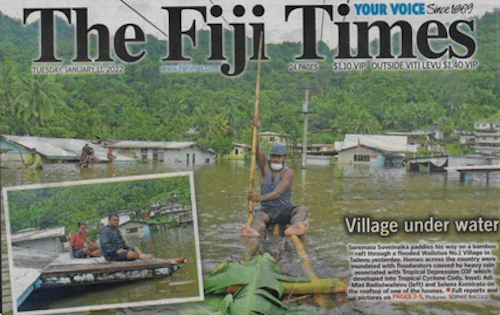A report on the Next Generation Radio project … covering climate change in Fiji in real time. Video: Next Gen
SPECIAL REPORT: By Michelle Betz in Ninole, Hawai’i
As Cyclone Cody got set to pummel Fiji in early January, students at the University of the South Pacific in Suva, Fiji were getting set to start a media training programme that would have them reporting on climate change.
“More than a little irony here,” says Doug Mitchell, founder and director of Next Generation Radio.
“We’ve experienced weather related challenges but nowhere close to this level. Add in the global pandemic, case numbers soaring, our students across the International Dateline and a cyclone, wow.
“Still, we do what journalists do, we find a way to keep going. I can’t say enough how proud I am of the professional team and a very special hat-tip to our folks in Fiji. They remained, undaunted.”
Oceania is perhaps the most vulnerable region in the world to climate change, yet Pacific Islanders don’t often have the opportunity to tell the world their climate change stories – stories about declining fisheries, increased cyclone activity, displacement and more.
“There is a difference when you are a local reporting an issue that directly affects you, it is more impactful — to be able to report climate change effects to Pacific Islanders, by a Pacific Islander”, says Sera Tikotikovatu-Sefeti, one of nine USP students taking part in the Next Gen training programme.
The Next Gen Radio programme is a US-based digital media training initiative and the Fiji project was Next Gen’s first ever international project.
Cyclone set to threaten Fiji
And the arrival of Cyclone Cody was set to threaten Fiji the same day the project was due to begin — illustrating not only the urgency of climate change but the need to ensure the region’s journalists have the skills needed to tell those stories.
“The importance of our programme has never been more clear. We’re not doing traditional reporting but finding people who have a story to tell, and we let them tell it,” says Mitchell.
The choice of climate change as a theme for the workshops was not accidental.
For Pacific islanders, land and ocean have huge economic, political and cultural significance – an ocean-based economy focused on maritime transportation, fisheries, extractive industries and tourism.
Yet these small island nations of the Pacific region are more vulnerable to the acute effects of climate change than any other region in the world.
And the importance of being able to tell those stories is paramount.

Ability to use any medium
Lice Movono is a Fijian journalist and serves as a mentor on the project.
“The ability to use any medium to tell the stories of the Pacific and its people and the challenges they face is so important,” she says.
“The Next Gen project offers senior journalism students and journalists working in the digital space to combine the strengths of radio broadcasting with available visibility tools to tell these stories effectively.
“Pacific people are oral people with rich traditional art and so this model of communications development is very relevant to the region’s storytellers.”
The students are being guided by a team of Next Gen staff and mentors — many of whom deployed to Hawai’i.
Each student is paired with a mentor and has support from a full team of audio producers, digital and visual editors and even editorial illustrators – all working remotely to guide the students through the storytelling process.
Everyone is literally in the virtual room as the storytelling gets underway.
“It’s great to be part of a team dedicated to increasing coverage of the Pacific on some of the most pressing issues facing Oceania. As a journalist indigenous to Micronesia who returned home to report, I am so humbled to be part of a team preparing the next generation to continue to make meaning,” says Thomas Mangloña, regional correspondent for KUAM on Guam and a project mentor.
Project an eye opener
Student Sera Tikotikovatu-Sefeti says the Next Gen project has been an eye opener.
“As a journalism student and writer, it has never occurred to me how much planning and prepping takes place before we actually go out into the field,” she says.
“The Next Gen project has given me the opportunity to learn from media specialists, illustrators and other work that goes into the field of radio and more. My impression of Next Gen is really just that – it is an extraordinary opportunity to collaborate with some of the best in the field, even if we are separated by time zones and miles apart, we connect through the same passion and this project gives us that opportunity to collaborate despite the distance. I’m learning so much and willing to learn so much more.”
The students will produce audio and digital stories highlighting the experiences of people in Fiji and Papua New Guinea whose lives are being affected by climate change.
The Next Gen programme is part of the Growing Independent Radio Broadcast Journalism in the Pacific Islands project that aims to bolster radio at both USP and across the Pacific and is administered by the East-West Center in partnership with the Institute for War and Peace Reporting.
“We are so excited to be working with journalists from USP and the whole Next Gen team,” said Scott Kroeker, project coordinator from the East-West Centre.
“The centre is always looking for opportunities to support media professionals in the Pacific Islands, and this project should have a direct and tangible impact on the careers of the young participants.”
Story telling prepared for Asia Pacific Report.
Article by AsiaPacificReport.nz




